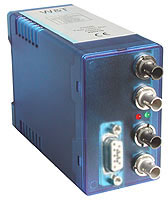Interface Glass Fiber-Bus ST <> Profibus
This article is still available for existing customers. If needed feel free to contact us by phone or e-mail:
+49 202/2680 110, info@wut.de
Properties
- RS485 interface with Profibus pinout
- Baud rate up to 1.5 Mbaud
- Electrical isolation to almost any extent between the connected devices
- Noise-immune and secure transmission over a distance of up to 3800 meters per segment
- Extended supply voltage range up to 24V
- Shipped optionally with or without power supply:
Please order power supplies as separate accessories. - No re-configuration of transmission parameters required
- Housing suitable for installation on top hat rails
-
Conforms to standards both in office and industrial environments:
- High noise resistance per EN 61000-6-2
- Low noise emission per EN 55032:2015 + A1 Cl. B, EN 61000-3-2 & EN 61000-3-3
- 5 year guarantee
Background information:
For data transmission across long distances and/or in extremely interfering environments, we strongly recommend the use of fiber-optic cables. Easily installed connections over relatively short distances up to 100 m are made possible by the use of plastic optical fiber cables, whereas for a distance segment of up to 3800 m, the use of fiber-optic lines is made necessary. The attenuation of the light in fiber-optic lines is considerably lower than that in plastic optical fiber cables.
While, in the past, the installation and preparation of fiber-optic lines was rather difficult, many suppliers now offer a comprehensive service of installation and customizing of cables, due to the fact that fiber-optic technology is now increasingly applied in commercial networks.
Technical data
- Operating mode:
- RS485 2-wire mode with echo suppression and
- automatic control of the RS485 transceivers
- Switching time:
- approx. 1µs for switching from data send to receive
- (can be changed on request)
- Baud rate:
- 0..1.5 Mbaud
- Data format:
- any format
- Transmitted signals:
- RxD-P/TxD-P, RxD-N/TxD-N
- Supported topologies:
- Bus and star, but no ring structures
- Cascadability:
- 5 Adapter @93.75 KBaud, 32 Adapter @19.2 KBaud
- Serial connection:
- 9-pin SUB-D socket
- Glass fiber connection:
- ST plug adapter
- SMA plug adapter on request
- Fiber-optic medium:
- Duplex multimode fiber-optic cable
- 50/125um, 62.5/125um
- 200/230um PCS fibers on request
- Max. distance:
- 50/125um: typically 3200m, min. 1400m @3dB/km
- 62.5/125um: typically 3800m, min. 2200m @3.5dB/km
- Optical budget:
- 50/125um: typically 9.6dB, min. 4.2dB
- 62.5/125um: typically 13.4dB, min. 8.0dB
- Wavelength:
- 820 nm
- Galvanic isolation:
- Isolation voltage min. 1 KV DC between
- between supply and serial connection
- Power supply:
- 12..24V DC/AC
- Current consumption:
- max. 150 mA at 12 V input voltage
- Supply voltage connection:
- Plug-in screw terminal, 5.08mm spacing
- Labeled "L+" and "M"
- Ambient temperature:
- Storage: -40..+70°C
- Operating in non-rowed installation: 0..+60°C
- Operating in rowed installation 0..+50°C
- Permissible relative humidity:
- 0..95% RH (non-condensing)
- Housing:
- Plastic small housing, 105x75x45mm
- Weight:
- approx. 100 g
- Scope of delivery:
- 1x Interface Glass Fiber-Bus ST <> Profibus
